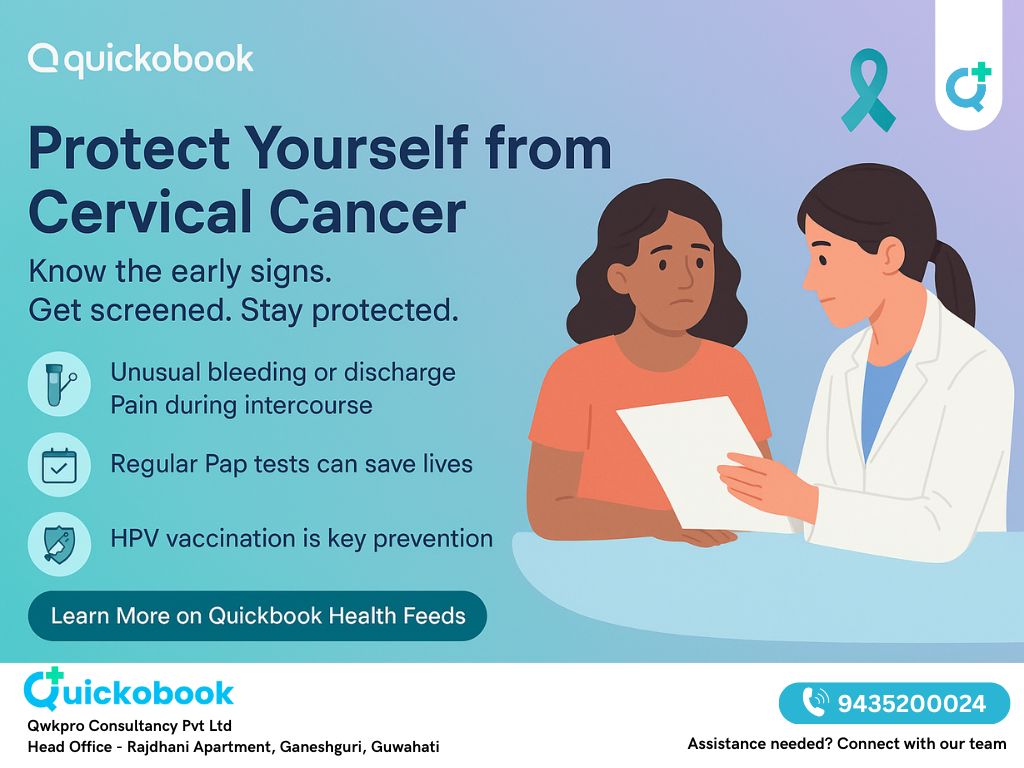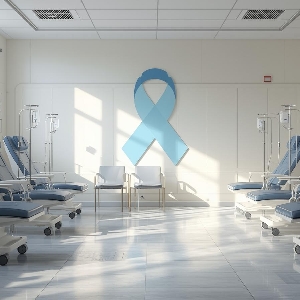Introduction
Cervical cancer is one of the most common cancers affecting women in India. It develops in the cervix—the lower part of the uterus—and is often caused by persistent infection with high-risk Human Papillomavirus (HPV). Early detection through screening and timely prevention can save lives. In this blog, we’ll discuss the early signs of cervical cancer, screening methods, and prevention tips, with insights from an Oncology doctor, gynaecologist, and other women’s health experts.
What is Cervical Cancer?
Cervical cancer occurs when abnormal cells grow uncontrollably in the cervix. It usually develops slowly, starting as precancerous changes called cervical dysplasia, which can be detected early through regular screening.
- Primary keyword focus: Oncology doctor
- Secondary keywords: Women’s health, Gynaecologist
Causes of Cervical Cancer
- Persistent HPV infection (high-risk strains like HPV 16 and 18)
- Weakened immune system
- Smoking
- Early sexual activity and multiple partners
- Long-term use of oral contraceptives
- Lack of screening
Early Signs of Cervical Cancer
Cervical cancer often has no symptoms in the early stages. However, warning signs may include:
- Abnormal vaginal bleeding (between periods, after sex, or post-menopause)
- Unusual vaginal discharge with foul odor
- Pelvic pain or pain during intercourse
- Longer and heavier menstrual periods
Tip: If you experience any of these, consult a Gynaecologist or oncology doctor immediately.
Screening for Cervical Cancer
Regular screening is crucial in detecting precancerous changes:
- Pap smear test: Detects abnormal cells in the cervix.
- HPV DNA test: Identifies high-risk HPV infections.
- Colposcopy: A closer examination of the cervix if abnormal cells are found.
Recommendation: Women aged 21–65 should undergo Pap smear tests every 3 years, or a combination of Pap + HPV test every 5 years.
Treatment Options
Treatment depends on the stage of cancer:
- Surgery – removing cancerous tissue.
- Radiation therapy – kills cancer cells using targeted beams.
- Chemotherapy – drugs to destroy cancer cells.
- Targeted therapy & immunotherapy – advanced options guided by an oncology doctor.
READ ALSO: Importance Of Regular Health Check-ups For Reproductive Health
Prevention Tips
- HPV vaccination: Safe and effective in preventing most cases of cervical cancer.
- Regular screening: Pap smear and HPV testing as advised.
- Safe sexual practices: Use protection and limit multiple partners.
- Quit smoking: Reduces risk significantly.
- Maintain immunity: Healthy diet, exercise, and regular check-ups with a gynaecologist.
Lifestyle & Women’s Health Tips
- Eat a diet rich in fruits, vegetables, and antioxidants.
- Exercise regularly to boost immunity.
- Practice good menstrual hygiene.
- Go for routine gynaecological check-ups.
- Follow oncology doctor’s advice for high-risk women.
When to See a Doctor
Consult a gynaecologist or oncology doctor if you experience:
- Unexplained vaginal bleeding
- Persistent pelvic pain
- Unusual discharge
- Family history of cervical cancer
Risks & Complications
- Infertility (from advanced treatment)
- Spread to other organs if untreated
- Higher recurrence risk if lifestyle risk factors persist
Conclusion
Cervical cancer is preventable and treatable if detected early. Regular screening, HPV vaccination, and healthy lifestyle habits can drastically reduce risks. Women should prioritize their women health by consulting a gynaecologist or oncology doctor for preventive care.
Quickobook CTA
Book an appointment with a trusted oncology doctor or gynaecologist near you through Quickobook. Early detection saves lives—don’t delay your health check-up.
Disclaimer
This article is for informational purposes only and is not a substitute for medical advice. Please consult a licensed gynaecologist or oncology doctor for personalized guidance.
FAQs on Cervical Cancer (50 Expert Answers)
Q1. What is cervical cancer?
A: Cervical cancer is cancer that starts in the cervix, often due to long-term HPV infection.
Q2. What causes cervical cancer?
A: The main cause is persistent infection with high-risk HPV strains.
Q3. What are the first signs of cervical cancer?
A: Abnormal bleeding, unusual discharge, and pelvic pain are early warning signs.
Q4. Can cervical cancer be prevented?
A: Yes, through HPV vaccination, screening, and lifestyle changes.
Q5. At what age should women start cervical cancer screening?
A: Screening usually begins at age 21.
Q6. How often should I get a Pap smear?
A: Every 3 years from 21–29, then every 3–5 years with HPV testing after 30.
Q7. What is the HPV vaccine?
A: A vaccine that protects against high-risk HPV strains that cause cervical cancer.
Q8. Is the HPV vaccine safe?
A: Yes, it is recommended by WHO and is safe for girls and women.
Q9. Can men get HPV?
A: Yes, men can carry and transmit HPV, and some strains can cause cancers in men.
Q10. Is cervical cancer common in India?
A: Yes, India has one of the highest rates of cervical cancer worldwide.
Q11. Who is at risk of cervical cancer?
A: Women with multiple partners, early sexual activity, smoking, and lack of screening.
Q12. What are Pap smear results?
A: They show whether cervical cells are normal, abnormal, or precancerous.
Q13. Does HPV always cause cancer?
A: No, most HPV infections clear on their own, but some persist and cause cancer.
Q14. How can I reduce my cervical cancer risk?
A: Get vaccinated, screened, and maintain a healthy lifestyle.
Q15. Can cervical cancer spread?
A: Yes, advanced cases can spread to bladder, rectum, or other organs.
Q16. What is colposcopy?
A: A test using a special microscope to closely examine the cervix for abnormal cells.
Q17. Does cervical cancer affect fertility?
A: Early treatment may preserve fertility, but advanced treatment may impact it.
Q18. How do oncology doctors treat cervical cancer?
A: Through surgery, radiation, chemotherapy, or a combination.
Q19. Can cervical cancer be cured?
A: Yes, if detected and treated in early stages.
Q20. Is cervical cancer painful?
A: Pain may occur in the pelvis or during intercourse, especially in later stages.
Q21. Do gynaecologists perform cervical cancer screening?
A: Yes, gynaecologists commonly perform Pap smears and HPV tests.
Q22. Can cervical cancer occur in young women?
A: Yes, but it is more common after age 30.
Q23. Is cervical cancer hereditary?
A: Family history may increase risk, but HPV is the main cause.
Q24. Can cervical cancer return after treatment?
A: Yes, recurrence is possible, so follow-up check-ups are essential.
Q25. What lifestyle changes lower cervical cancer risk?
A: Quit smoking, eat healthy, and practice safe sex.
Q26. Can pregnancy cause cervical cancer?
A: No, but changes during pregnancy may reveal abnormalities.
Q27. What is cervical dysplasia?
A: Precancerous changes in the cervix that can be detected through screening.
Q28. Do all women need HPV vaccination?
A: It’s recommended for girls and women up to age 26, sometimes up to 45.
Q29. How much does a Pap smear cost in India?
A: Around ₹500–₹1,500 depending on location and hospital.
Q30. Is cervical cancer contagious?
A: No, but HPV infection, which causes it, is sexually transmitted.
Q31. What if my Pap smear is abnormal?
A: Your doctor may recommend further tests like colposcopy or biopsy.
Q32. How effective is the HPV vaccine?
A: It prevents over 70% of cervical cancers caused by HPV.
Q33. Do oncology doctors recommend HPV vaccines in India?
A: Yes, oncology doctors and gynaecologists strongly recommend it.
Q34. Can poor hygiene cause cervical cancer?
A: No, but poor hygiene may increase infection risks.
Q35. Does cervical cancer affect only married women?
A: No, it can affect any woman exposed to HPV.
Q36. What is the survival rate for cervical cancer?
A: Early-stage survival is high; late-stage survival is lower.
Q37. Can Ayurveda or homeopathy cure cervical cancer?
A: No, only evidence-based medical treatments are effective.
Q38. Can I prevent cervical cancer naturally?
A: Healthy lifestyle helps, but vaccination and screening are key.
Q39. What are advanced symptoms of cervical cancer?
A: Leg pain, swelling, difficulty urinating, and weight loss.
Q40. How is HPV transmitted?
A: Through skin-to-skin contact during sexual activity.
Q41. Can condoms fully protect against HPV?
A: They reduce risk but do not provide 100% protection.
Q42. Can a gynecologist treat cervical cancer?
A: Gynecologists detect and manage early stages; oncology doctors handle advanced cases.
Q43. How long does cervical cancer take to develop?
A: It can take 10–15 years from HPV infection to cancer.
Q44. Can men be vaccinated against HPV?
A: Yes, vaccination is also recommended for boys.
Q45. What foods help in prevention?
A: Leafy greens, citrus fruits, turmeric, and antioxidant-rich foods.
Q46. Can stress cause cervical cancer?
A: Stress does not directly cause it but may weaken immunity.
Q47. Can I exercise during cervical cancer treatment?
A: Light exercise may be safe; consult your oncology doctor.
Q48. Are Pap smears painful?
A: They may cause mild discomfort but are not painful.
Q49. How long is recovery after cervical cancer treatment?
A: Recovery depends on treatment type, usually weeks to months.
Q50. Why is women’s health awareness important for cervical cancer?
A: Awareness leads to early detection, timely treatment, and better outcomes.









Comments (0)
No comments yet. Be the first to share your thoughts!
Leave a Comment